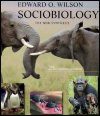Monograph
By: Edward O Wilson(Author)
696 pages, 31 b/w photos, 209 b/w illustrations, 43 tables
![Sociobiology Sociobiology]()
Click to have a closer look
About this book
Contents
Customer reviews
Biography
Related titles
About this book
When this classic work was first published in 1975, it created a new discipline and started a tumultuous round in the age-old nature versus nurture debate. Although voted by officers and fellows of the international Animal Behavior Society the most important book on animal behaviour of all time, Sociobiology is probably more widely known as the object of bitter attacks by social scientists and other scholars who opposed its claim that human social behaviour, indeed human nature, has a biological foundation. The controversy surrounding the publication of the book reverberates to the present day.
In the introduction to this Twenty-Fifth Anniversary Edition, Edward O. Wilson shows how research in human genetics and neuroscience has strengthened the case for a biological understanding of human nature. Human sociobiology, now often called evolutionary psychology, has in the last quarter of a century emerged as its own field of study, drawing on theory and data from both biology and the social sciences.
For its still fresh and beautifully illustrated descriptions of animal societies, and its importance as a crucial step forward in the understanding of human beings, this anniversary edition of Sociobiology: The New Synthesis will be welcomed by a new generation of students and scholars in all branches of learning.
Contents
Part I. Social Evolution
1. The Morality of the Gene
2. Elementary Concepts of Sociobiology
3. The Prime Movers of Social Evolution
4. The Relevant Principles of Population Biology
5. Group Selection and Altruism
6. Group Size, Reproduction, and Time-Energy Budgets
Part II. Social Mechanisms
7. The Development and Modification of Social Behavior
8. Communication: Basic Principles
9. Communication: Functions and Complex Systems
10. Communication: Origins and Evolution
11. Aggression
12. Social Spacing, Including Territory
13. Dominance Systems
14. Roles and Castes
15. Sex and Society
16. Paternal Care
17. Social Symbioses
Part III. The Social Species
18. The Four Pinnacles of Social Evolution
19. The Colonial Microorganisms and Invertebrates
20. The Social Insects
21. The Cold-Blooded Vertebrates
22. The Birds
23. Evolutionary Trends within the Mammals
24. The Ungulates and Elephants
25. The Carnivores
26. The Nonhuman Primates
27. Man: From Sociobiology to Sociology
Glossary
Bibliography
Index
Customer Reviews
Biography
Edward O. Wilson was Pellegrino University Professor, Emeritus, at Harvard University. In addition to two Pulitzer Prizes (one of which he shared with Bert Hölldobler), Wilson won many scientific awards, including the National Medal of Science and the Crafoord Prize of the Royal Swedish Academy of Sciences.
Monograph
By: Edward O Wilson(Author)
696 pages, 31 b/w photos, 209 b/w illustrations, 43 tables
"It is impossible to leave Wilson's book without having one's sense of life permanently and dramatically widened."
– Fred Hapgood, The Atlantic
"Rarely has the world been provided with such a splendid stepping stone for an exciting future of a new science."
– John Tyler Bonner, Scientific American
"Sociobiology explores the possibility that animal social behaviour – group living, kinship, attraction and mating, reciprocity and sharing, cooperation, conflict, and cheating, to name just the most familiar – has a genetic basis and can be shaped by natural selection; genes can be shaped by natural selection; genes can code for social behaviours in the same way that they code for body parts such as hands, hooves, eyes, antlers and ears. But, in an audacious final chapter, Wilson extended the analysis to humans: biology had grabbed our kinship, cooperation, mate preferences and the rest. Some branded Wilson and his ideas fascist, others as racist or guilty of genetic determinism. They are none of these things and, two Pulitzer Prizes later, Wilson has been vindicated [...] Wilson's Sociobiology laid the foundations for a lifetime of meditations."
– Mark Pagel, The Times Higher Education Supplement
"A towering theoretical achievement of exceptional elegance [...] Like most great books, Sociobiology is unpedantic, lucid, and eminently accessible."
– Pierre L. van den Berghe, Contemporary Sociology
"This book enthralls and enchants [...] If you have this book [...] you can begin getting your mind ready for the illuminations about human society."
– Lewis Thomas, Harper's
"Its contents do indeed provide a new synthesis, of wide perspective and great authority [...] Wilson's plain uncluttered prose is a treat to read, his logic is rigorous, his arguments are lucid."
– V.C. Wymne-Edwards, Nature
"Sociobiology, a new concept, is one with extraordinary potential value for understanding and explaining human behavior."
– Practical Psychology
"This book will stand as a landmark in the comparative study of social behavior."
– Quarterly Review of Biology
"Sociobiology is an excellent book, full of extraordinary insights, and replete with the beauty and poetry of the animal kingdom."
– The Times Literary Supplement


































